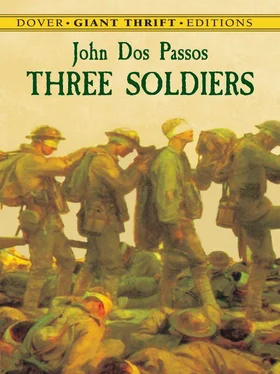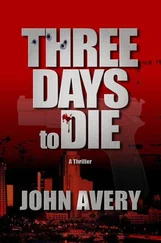Time dragged out interminably.
At last, coming back to the edge of the wharf, Andrews saw that there were no more bags in the barge. He sat down on the plank, too exhausted to think. Blue-grey dusk was closing down on everything. The Passy bridge stood out, purple against a great crimson afterglow.
The Kid sat down beside him, and threw an arm trembling with excitement round his shoulders.
“The guard’s lookin’ the other way. They won’t miss us till they get to the truck… Come on, Skinny,” he said in a low, quiet voice.
Holding on to the plank, he let himself down into the speeding water. Andrews slipped after him, hardly knowing what he was doing. The icy water closing about his body made him suddenly feel awake and vigorous. As he was swept by the big rudder of the barge, he caught hold of the Kid, who was holding on to a rope. They worked their way without speaking round to the outer side of the rudder. The swift river tugging savagely at them made it hard to hold on.
“Now they can’t see us,” said the Kid between clenched teeth. “Can you work your shoes an’ pants off?”
Andrews started struggling with one boot, the Kid helping to hold him up with his free hand.
“Mine are off,” he said. “I was all fixed.” He laughed, though his teeth were chattering.
“All right. I’ve broken the laces,” said Andrews.
“Can you swim under water?”
Andrews nodded.
“We want to make for that bunch of barges the other side of the bridge. The barge people’ll hide us.”
“How d’ye know they will?”
The Kid had disappeared.
Andrews hesitated a moment, then let go his hold and started swimming with the current for all his might.
At first he felt strong and exultant, but very soon he began to feel the icy grip of the water bearing him down; his arms and legs seemed to stiffen. More than against the water, he was struggling against paralysis within him, so that he thought that every moment his limbs would go rigid. He came to the surface and gasped for air. He had a second’s glimpse of figures, tiny like toy soldiers, gesticulating wildly on the deck of the barge. The report of a rifle snapped through the air. He dove again, without thinking, as if his body were working independently of his mind.
The next time he came up, his eyes were blurred from the cold. There was a taste of blood in his mouth. The shadow of the bridge was just above him. He turned on his back for a second. There were lights on the bridge.
A current swept him past one barge and then another. Certainty possessed him that he was going to be drowned. A voice seemed to sob in his ears grotesquely: “And so John Andrews was drowned in the Seine, drowned in the Seine, in the Seine.”
Then he was kicking and fighting in a furious rage against the coils about him that wanted to drag him down and away. The black side of a barge was slipping up stream beside him with lightning speed. How fast those barges go, he thought. Then suddenly he found that he had hold of a rope, that his shoulders were banging against the bow of a small boat, while in front of him, against the dull purple sky, towered the rudder of the barge. A strong warm hand grasped his shoulder from behind, and he was being drawn up and up, over the bow of the boat that hurt his numbed body like blows, out of the clutching coils of the water.
“Hide me, I’m a deserter,” he said over and over again in French. A brown and red face with a bristly white beard, a bulbous, mullioned sort of face, hovered over him in the middle of a pinkish mist.
“OH, qu’il est propre! Oh, qu’il a la peau blanche!” Women’s voices were shrilling behind the mist. A coverlet that felt soft and fuzzy against his skin was being put about him. He was very warm and torpid. But somewhere in his thoughts a black crawling thing like a spider was trying to reach him, trying to work its way through the pinkish veils of torpor. After a long while he managed to roll over, and looked about him.
“Mais reste tranquille,” came the woman’s shrill voice again.
“And the other one? Did you see the other one?” he asked in a choked whisper.
“Yes, it’s all right. I’m drying it by the stove,” came another woman’s voice, deep and growling, almost like a man’s.
“Maman’s drying your money by the stove. It’s all safe. How rich they are, these Americans!”
“And to think that I nearly threw it overboard with the trousers,” said the other woman again.
John Andrews began to look about him. He was in a dark low cabin. Behind him, in the direction of the voices, a yellow light flickered. Great dishevelled shadows of heads moved about on the ceiling. Through the close smell of the cabin came a warmth of food cooking. He could hear the soothing hiss of frying grease.
“But didn’t you see the Kid?” he asked in English, dazedly trying to pull himself together, to think coherently. Then he went on in French in a more natural voice:
“There was another one with me.”
“We saw no one. Rosaline, ask the old man,” said the older woman.
“No, he didn’t see anyone,” came the girl’s shrill voice. She walked over to the bed and pulled the coverlet round Andrews with an awkward gesture. Looking up at her, he had a glimpse of the bulge of her breasts and her large teeth that glinted in the lamplight, and very vague in the shadow, a mop of snaky, disordered hair.
“Qu’il parle bien français,” she said, beaming at him.
Heavy steps shuffled across the cabin as the older woman came up to the bed and peered in his face.
“Il va mieux,” she said, with a knowing air.
She was a broad woman with a broad flat face and a swollen body swathed in shawls. Her eyebrows were very bushy, and she had thick grey whiskers that came down to a point on either side of her mouth, as well as a few bristling hairs on her chin. Her voice was deep and growling, and seemed to come from far down inside her huge body.
Steps creaked somewhere, and the old man looked at him through spectacles placed on the end of his nose. Andrews recognized the irregular face full of red knobs and protrusions.
“Thanks very much,” he said.
All three looked at him silently for some time. Then the old man pulled a newspaper out of his pocket, unfolded it carefully, and fluttered it above Andrews’s eyes. In the scant light Andrews made out the name: “Libertaire.”
“That’s why,” said the old man, looking at Andrews fixedly, through his spectacles.
“I’m a sort of a socialist,” said Andrews.
“Socialists are good-for-nothings,” snarled the old man, every red protrusion on his face seeming to get redder.
“But I have great sympathy for anarchist comrades,” went on Andrews, feeling a certain liveliness of amusement go through him and fade again.
“Lucky you caught hold of my rope, instead of getting on to the next barge. He’d have given you up for sure. Sont des royalistes, ces salauds-la.”
“We must give him something to eat; hurry, Maman… Don’t worry, he’ll pay, won’t you, my little American?”
Andrews nodded his head.
“All you want,” he said. “No, if he says he’s a comrade, he shan’t pay, not a sou,” growled the old man.
“We’ll see about that,” cried the old woman, drawing her breath in with an angry whistling sound.
“It’s only that livin’s so dear nowadays,” came the girl’s voice.
“Oh, I’ll pay anything I’ve got,” said Andrews, peevishly, closing his eyes again.
He lay a long while on his back without moving.
A hand shoved in between his back and the pillow roused him. He sat up. Rosaline was holding a bowl of broth in front of him that steamed in his face.
Читать дальше












